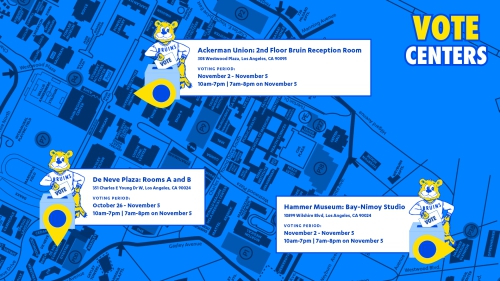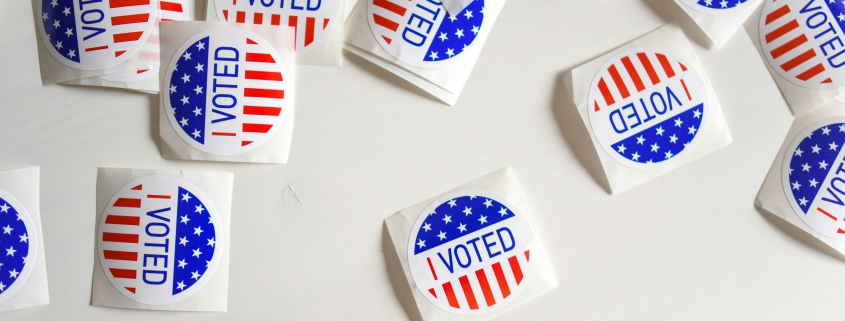Election 2024: Center for Community Engagement supporting Civic Engagement
By Kayla McCormack | November 4, 2024
UCLA has long been committed to encouraging civic engagement on campus. The BruinsVote program, a voter registration and mobilization effort developed by a non-partisan coalition of students, student organizations and campus partners is just one longstanding example.
The 2024 election is no exception. New this year is the Civic Learning and Democratic Engagement (CLDE) Network, a campuswide initiative coordinated by Campus Life and the Center for Community Engagement, which has played a key role in encouraging Bruins to actively participate in this election.
The CLDE Network unites campus and community partners to advance civic education and foster democratic involvement among students, faculty and external partners. Through coordinated efforts, the network strengthens campus-wide engagement, shares resources and addresses both challenges and opportunities related to civic learning. It’s open to all members of the campus community who have an interest in promoting civic learning and democratic engagement among UCLA students.
The recently launched CLDE Network website offers Bruins an online portal featuring events, programs and resources around campus that can provide guidance on the election process and ballot initiatives. The CLDE Network complements UCLA’s ongoing efforts by providing comprehensive information on campus initiatives and programs related to civic learning and democratic engagement.

UCLA is also hosting voting centers on campus for the 2024 election, providing students and community members with convenient access to cast their ballots.
Doug Barrera, Associate Director for Faculty and Community Engagement with the Center for Community Engagement is one of the co-facilitators of the CLDE Network. “Civic engagement among college students is an issue that is being spoken about nationally in higher education,” said Barrera. “Many believe that colleges and universities have an important role to play in strengthening our democracy. The CLDE Network at UCLA is connected, in many ways, to efforts being taken throughout the UC system, and higher education in general, to address these challenges.”
Continue reading for more of Barrera’s insights into the impact and future of the CLDE network.
What is the Center for Community Engagement’s role in the CLDE?
I serve as one of three co-facilitators of the network. Due to our role in supporting faculty who do community-engaged teaching and research, I have focused my efforts for the network around engaging faculty who may have an interest in CLDE. One important contribution toward that goal was to secure incentive funding for faculty to teach a Fiat Lux course under the special theme of CLDE this fall.
How does the new CLDE website contribute to UCLA’s broader mission of promoting civic engagement among students?
The CLDE website serves as a repository of events and resources related to this subject at UCLA. These include events related to the election this fall, democracy workshops, information about both internal and external resources dedicated to encouraging students to register and vote, research institutes that focus on issues connected to politics and democratic participation, and ways for students to get involved.
What do you see as the biggest challenges in fostering civic learning and democratic engagement on a college campus? How do you think the CLDE Network will help overcome some of these challenges?
Students are extremely busy. They have heavy class loads, they work, they’re often part of multiple clubs and organizations, they have family responsibilities, and in what little downtime they have, participating in democracy is probably not the first thing that comes to mind. We also have something of a toxic political environment in our country, that I expect is a turn-off for most young people.
So, we have to find ways to incentivize civic learning and democratic engagement and make it more appealing. Students have to see that it’s important enough to their lives that they want to do something about it, and they need to believe that they can actually contribute to change.
Our hope is that the CLDE network can both coordinate and promote the varied efforts and events that take place on our campus related to democratic participation. We also want to tap into the knowledge and experience of network members to identify ways that we can encourage student participation, and help students feel that they have the power to create change.
How do you envision the CLDE Network evolving in the next few years?
I believe that we have to move in the direction of giving students tangible reasons for, and methods to, participate in our democracy. We can’t simply talk about democracy in the abstract. Students need to see that when they vote, or join a campaign, or advocate for a cause, or speak to policymakers, or talk to one another about challenging social issues, etc., it will result in some tangible outcome. They need to see their power in action. As we move past the election season of 2024, the network will need to figure out how to continue to engage our students.
Learn more about UCLA’s 2024 Election Resources here.


 element5digital/unsplash
element5digital/unsplash
 Composite by Tina Hordzwick/UCLA
Composite by Tina Hordzwick/UCLA